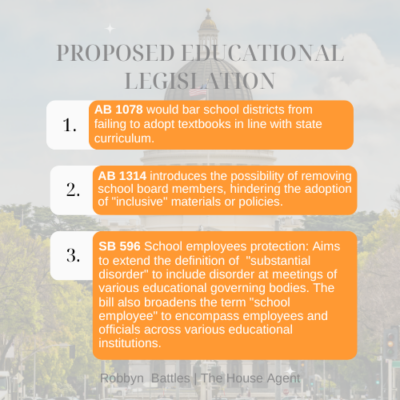 The correlation between school rankings and property values highlights the crucial involvement of homeowners in educational discussions, regardless of having school-aged children. Proposition 39, enacted in 2000, reduced the required majority for passing new bond/tax measures from a 60% supermajority to 55% approval by voters. Currently under consideration, AB 1078 proposes raising the vote to a supermajority for state-mandated curriculum changes at the local school board level. Additionally, AB 1314 introduces the possibility of removing school board members, hindering the adoption of “inclusive” materials or policies. The combined effect of AB 1314 and AB 1078 could grant more authority to the California Department of Education in shaping local school policies, potentially diminishing the role of local school boards and communities. Delving into these essential matters is vital for making well-informed decisions that may influence your property’s value and your community’s education. Agree or disagree, being informed is the most important takeaway.
The correlation between school rankings and property values highlights the crucial involvement of homeowners in educational discussions, regardless of having school-aged children. Proposition 39, enacted in 2000, reduced the required majority for passing new bond/tax measures from a 60% supermajority to 55% approval by voters. Currently under consideration, AB 1078 proposes raising the vote to a supermajority for state-mandated curriculum changes at the local school board level. Additionally, AB 1314 introduces the possibility of removing school board members, hindering the adoption of “inclusive” materials or policies. The combined effect of AB 1314 and AB 1078 could grant more authority to the California Department of Education in shaping local school policies, potentially diminishing the role of local school boards and communities. Delving into these essential matters is vital for making well-informed decisions that may influence your property’s value and your community’s education. Agree or disagree, being informed is the most important takeaway.
Article from The Center Square California
The California Department of Education (CDE) announced it is doubling down on its “inclusive education” initiatives, launching new training programs to expand its ethnic studies high school graduation requirement and supporting legislation to strengthen state control over local curriculums.
Under AB 101, passed in 2021 and sponsored by State Superintendent Tony Thurmond, California public high schools must offer ethnic studies courses by the 2025-2026 school year, and at least one semester-long ethnic studies course will be required for public high school graduation by the 2029-2030 school year. To accelerate the adoption of such courses, the California Department of Education is hosting a series of webinars on how to use the Ethnic Studies Model Curriculum Guide to meet state guidelines and deadlines.
The CDE also used the occasion to announce its continued support for AB 1078, a bill Thurmond sponsored and helped write, and would bar school districts from failing to adopt textbooks in line with state curriculum requirements by creating a mechanism for the county superintendent to request the CDE purchase the needed materials, with the cost to automatically be passed on to the school district in question. The bill would also require a ⅔ supermajority, not a simple majority, of votes in a school board to remove any “inclusive” curriculum elements and give parents a means of challenging said removals with the county Board of Education. Combined with AB 1314, another pending bill that would allow for the removal of school board members who prevent school districts from adopting “inclusive” materials or policies, this measure would greatly expand the ability of the California Department of Education to determine local school board education policies.
Analysts noted in the state legislative digest published for the bill: “By imposing new obligations on local educational agencies, the bill would create a state-mandated local program.”
“Inclusive education is proven to help students of color, LGBTQ+ students, and students of all backgrounds to make academic improvement and to support the social development of students,” Thurmond said. “We will continue to support our students and will not stand by as school districts attempt to discriminate against students.”
“This is an international, white Christian Nationalism movement that is trying to pull on the strings of people who feel marginalized, left out, in economic trouble, and using that anger to target specific groups for political gains,” Jackson said.”
As originally authored by Jackson, groups required in inclusive education materials originally included “people of all genders, Latino Americans, LGBTQ+ Americans, and members of other ethnic, cultural, religious, and socioeconomic status groups,” but was later amended for “religious” to be removed.
This is a reprint of an article from The Center Square California
Additional Educational Bills.
California Proposition 39 passed by voters in 2000, Decreased Supermajority from Two-Thirds to 55% for School Bonds Amendment
Why this push to decrease or increase the the percentage of voter approval on certain legislation?
California SB 596 School employees: protection: Existing law provides that any parent, guardian, or other person whose conduct in a place where a school employee is required to be in the course of the employee’s duties materially disrupts classwork or extracurricular activities or involves substantial disorder is guilty of a misdemeanor punishable by a fine of not less than $500, nor more than $1,000, or by imprisonment in a county jail not exceeding one year, or by both imprisonment and the fine. Existing law provides for certain minimum periods of imprisonment in a county jail for subsequent convictions for the above-described offenses, as specified. This bill would specify, for purposes of the above-described offense, that “substantial disorder” includes substantial disorder at any meeting of the governing board of a school district, the governing body of a charter school, a county board of education, or the State Board of Education. The bill would define a “school employee” as any employee or official of a school district, a charter school, a county office of education, a county board of education, the state board, or the State Department of Education. To the extent the bill expands the scope of an existing crime, the bill would impose a state-mandated local program.

